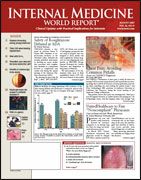Investigational Agent Reduces Arthritis Symptoms
By Jill Stein
BARCELONA, Spain—The investigational agent tocilizumab (Actemra; Roche), given in combination with the treatment standard methotrexate (Trexall), provides a rapid and significant improvement in rheumatoid arthritis (RA) symptoms compared with methotrexate alone, investigators reported at the European League Against Rheumatism annual meeting.
In this phase 3 trial, 44% of patients who received tocilizumab on top of methotrexate had a 50% reduction in symptoms according to American College of Rheumatology (ACR) criteria (ACR50 response) at 24 weeks versus only 11% of patients who received placebo plus methotrexate.
Tocilizumab is a humanized monoclonal antibody specific for the human interleukin-6 (IL-6) receptor. "Interleukin-6 has been implicated in the pathogenesis of RA and likely plays a role in synovial inflammation and in the damage to periarticular bone and cartilage," Josef Smolen, MD, chairman of the rheumatology department at the Medical University of Vienna, Austria, and lead investigator of the Tocilizumab Pivotal Trial in Methotrexate Inadequate Responders, observed.
"The inhibition of IL-6 signaling thus represents a promising therapeutic approach to RA treatment," he said. This class is not yet available in the United States.
More than 50% of patients treated with biologics or traditional disease-modifying antirheumatic drugs (DMARDs) continue to have clinically significant activity and lifestyle limitations, Dr Smolen added.
In this study, 623 patients with moderate-to-severe active RA and an inadequate response to methotrexate were randomized to tocilizumab 8 mg/kg, tocilizumab 4 mg/kg, or placebo intravenously every 4 weeks. Participants continued to receive concomitant oral or parenteral methotrexate at their prestudy dose throughout the trial; no other DMARDs were allowed during the study.
The primary end point was the proportion of patients achieving an ACR20 response at 24 weeks. Overall, 58.5% of patients in the 8-mg/kg group and 47.9% in the 4-mg/kg group achieved ACR20 responses at week 24 compared with 26.5% in the placebo group. And 22% of the tocilizumab 8-mg/kg group achieved ACR70. "ACR70 is recognized as an excellent therapeutic goal," Dr Smolen noted. Only 2% of the placebo group achieved ACR70.
Disease Activity Score was also reduced more with tocilizumab than placebo. Disease remission occurred in 28% of those receiving tocilizumab 8 mg/kg plus methotrexate compared with 1% of patients treated with methotrexate alone. Clinically meaningful improvements were seen for all measures in the tocilizumab-treated patients.
The IL-6 receptor inhibitor was generally well tolerated. Infections requiring hospitalization or use of IV antimicrobial therapy occurred in 6 patients in the higher-dose tocilizumab group, 3 patients in the lower-dose group, and 2 patients taking placebo.
Dr Smolen said that tocilizumab represents a "pivotal advance" in RA management, adding that its high efficacy confirms the critical role of IL-6 in the pathophysiology of the disease.
Denosumab Slows Bone Erosion
Another study presented at the meeting showed that adding the investigational compound denosumab (Amgen) to conventional methotrexate (Trexall) therapy postpones bone erosion in patients with RA.
Adjunctive denosumab, however, does not significantly improve ACR pain scores.
Denosumab is a fully human monoclonal antibody that targets the receptor activator of nuclear factor κB ligand, which is a key mediator of the resorptive phase of bone remodeling.
"Our data demonstrate the significant potential of denosumab," said Desiree van der Heijde, MD, professor of rheumatology at Leiden University Medical Center, the Netherlands.
The lack of improvement in ACR scores, which quantifies pain and other symptoms of inflammation, was not surprising, since denosumab does not affect inflammation, Dr van der Heijde added.
This study randomized 227 patients to a 60- or 180-mg subcutaneous injection of denosumab or placebo every 6 months. Participants had at least 6 swollen joints and erosive disease. All had been diagnosed at least 6 months earlier and were receiving stable methotrexate therapy.
P
In this phase 2 study, patients in the higher-dose denosumab group demonstrated significantly less progression of bone erosion on magnetic resonance imaging than placebo-treated patients at 6 months ( <.019); however, the lower dose of the drug did not significantly slow bone erosion.
